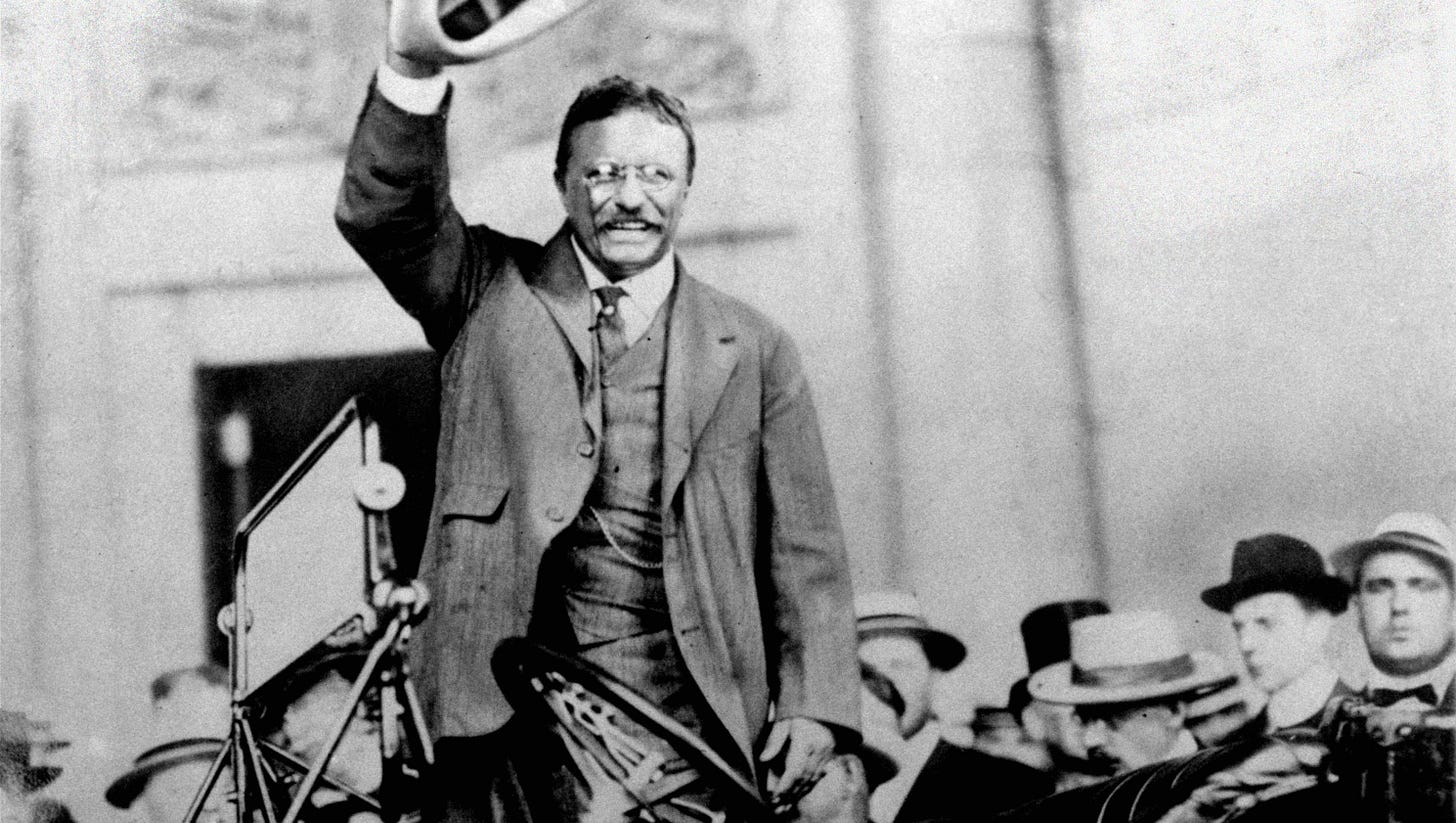Machiavelli, War in Ukraine, and American Naiveté
This is the year I learned America is all the things I knew it was, but the elites would never allow it to be.
This past month I was blessed to be part of a book club formed by Ben Domenech to complement his invaluable The Transom newsletter (of which I HIGHLY recommend subscribing). I don’t use blessed lightly here; I am painfully shy in social settings and a natural introvert, so this was an exercise in discomfort but more importantly, it was a forum for strangers scattered across the country to discuss a challenging work through intelligent, profound exchanges. The process was illuminating not just for the subject matter, but also because the nature of the informal symposium demanded a focus too uncommon in a society subsisting on 15-second attention spans and 280-character slogans. We discussed James Burnham’s The Machiavellians which I found to be both the very best challenge to a deficit of attention and a tool to sharpen a dulled spirit. NB: If you haven’t listened to nor heard Johann Hari, take the time to check him out – you’ll probably find yourself already very familiar with the concepts he brings forth, especially his book, Stolen Focus, which delves into the plight of modern society starved for meaning because of its attention crisis.
America is still the last haven of people who desire to live in freedom, even as powerful, status-minded elitists try to convince us it isn’t meaningful or even necessary when they offer the blanket of their security and safety instead. But what I have struggled with, and I think the insights offered by Burnham helped me come to terms with, is that an idealized America — one in which freedom is individual, political, and intellectual; that promotes human dignity and is willing to defend it; that liberty is precious and the peril that accompanies it outweighs safely suffocating under forced compliance — is at odds with political reality. But that friction isn’t necessarily an existential threat. It only becomes so when we continue to act as if the world is as we want it to be instead of what it actually is; never more so than the war happening in Ukraine and the depth of America’s involvement in it.
It was because of 9/11 that I made the decision to join the military. I felt it my patriotic duty and as someone who is easily moved to tears when the Star-Spangled banner plays, was not a hard decision. What better cause than to join the fight in the cause of liberty in defense of freedom? For a naïve 20-year-old, the lines of good versus evil were as clear as action versus inaction. America, despite its flaws and missteps, was earnest in spirit and the inheritor of a type of global Monroe Doctrine after World War II in whose hands were entrusted the survival of Western democracies and a sentry guarding against tyranny. It wasn’t until 20 years later in the hospital giving birth to my son, I realized how shallow and callous our political and military leaders considered that which I believed was priceless: belief in the goodness of this country and the generational blood that was spilled to maintain that ideal.
Early in The Machiavellians, Burnham writes, "politics is primarily the study of the struggles for power among men," we cannot live successfully as a society where we live by platitudes, idealism, or hopes instead of facts. But it does not mean we should abandon the cause of freedom, the defense of liberty, nor ignore the fight between good and evil that lies in the heart of every man.
What struck me reading The Machiavellians was realizing that I was relying too much on faith in institutions I thought were incorruptible and I allowed myself to fall into a moral trap believing those apparent failures were inextricable from the idea of America itself. The Afghanistan debacle was perhaps the most disillusioning moment of my adult life and one in which the world was witnessing the collapse of America’s reputation, power, influence, and honor in real-time. Even worse, our leaders glibly justified this concession as the price for ending our war in the Middle East. The Biden Administration, together with a politicized military establishment, were the architects of an exit strategy that could not preclude obvious and shameful abandonment of our promise to that country, our active-duty military, our veterans, and the memory of 9/11.
The hallmark of our current military-political complex was reflected at the moment when President Biden stood before the American people and proclaimed “The buck stops with me” but not before laying blame for his withdrawal at the feet of former President Trump, the Afghan people, and Afghan President Ashraf Ghani. It marks a disillusionment of Americans, like myself, who feel betrayed by idealism but it is perhaps a symptom of an evolving hierarchy that took advantage of a concentration of power and access (or lack thereof) to upward mobility in both economic and political terms, using an ever-expanding federal government as a vehicle. It is open scorn between competing classes – mass consumerism versus prestige, managerial class versus laborers, autonomy versus dependence, the rule-makers versus those who must live by them ... We are seeing this in the context of America's stumble both at home and abroad with grievous implications for our future, but we must never be fooled into thinking we are beholden to an inevitable twilight of power, that America’s time has passed, and the world has moved past the traditional notions and order of history for a modern rule of thought beyond good and evil shaped by nefarious world actors.
What has me angered beyond the scope of reason and slogging through sadness for what America should be at this moment, is disappointment in how what once was a non-negotiable stand for human dignity, freedom, and self-determination has been betrayed by an elite class that cares nothing for those things. But the last year has hardened my heart and made me cynical about everything I thought I knew and trusted. I see a president lamenting Russian aggression built on decades of globalist diplomacy for which he is an advocate, an unserious class of people whose accomplishments amount to degrees from the Harvard Kennedy School and attending cocktail parties in Turtle Bay, applauding monsters on the U.N. Human Rights Committee, and sending up toothless warnings to murderous dictators. Those who trumpet their expertise and claim their self-righteous place at the thrones of power do not care for me nor the kids fighting their wars and think a patriotic love of America is a sign of stupidity and unsophistication. This is the year I learned the idealistic girl from my youth would be betrayed by her own innocence. This is the year I learned America is all the things I knew it was, but the elites would never allow it to be.
Reading The Machiavellians forced me back from the brink of jaded weariness by considering the importance of what Machiavelli called virtu, or the will to power, “Those who are capable of rule are above all those who want to rule. They drive themselves as well as others; they have that quality which makes them keep going, endure amid difficulties, persist against danger.” But I believe, maybe in my persistent naivety, that in America’s case — in Americans’ hearts and souls – that we tip the balance of our power towards a benevolent purpose. That is what made seeing the debacle unfolding in Afghanistan so difficult to accept. This is why it is so heart-wrenching to witness the cruelty and violence in Ukraine and feel we are falling short of our commitment to liberty.
Unlike the Afghanistan withdrawal, which was mostly seen as a self-inflicted wound, the war in Ukraine feels like we are abandoning our post at the line between good and evil, that we are on the wrong side of the lessons learned from World War II. There is also now a deep-seated skepticism of the motivations of our political leaders and the strength of our convictions. In his 1905 Inaugural Address, President Theodore Roosevelt’s words offer a guide to finding a balance between responsibility and hubris and righteousness. He proclaimed
Much has been given us, and much will rightfully be expected from us. We have duties to others and duties to ourselves; and we can shirk neither. We have become a great nation, forced by the fact of its greatness into relations with the other nations of the earth, and we must behave as beseems a people with such responsibilities. Toward all other nations, large and small, our attitude must be one of cordial and sincere friendship. We must show not only in our words but in our deeds, that we are earnestly desirous of securing their goodwill by acting toward them in a spirit of just and generous recognition of all their rights. But justice and generosity in a nation, as in an individual, count most when shown not by the weak but by the strong. While ever careful to refrain from wrongdoing others, we must be no less insistent that we are not wronged ourselves. We wish peace, but we wish the peace of justice, the peace of righteousness. We wish it because we think it is right and not because we are afraid. No weak nation that acts manfully and justly should ever have cause to fear us, and no strong power should ever be able to single us out as a subject for insolent aggression.
In twenty years when my son asks me about these times, I hope my answer echoes that of the idealism of my own youth and the proclamation of President Roosevelt, that America held high the light of freedom and it stood strong and defiant in the face of tyranny. This doesn’t mean we use our standing as a provocation for involvement in a European war, but it does mean that we support those who fight for their own liberty against tyranny. I will tell him that knowing the morally virtuous path is easy but to walk it seldom is, and to never allow America to trade its honor for the easy path.
What I love about Substack is getting feedback from people I otherwise wouldn’t know. I’m smaller than small potatoes so my goal (reflecting my determined realism), is to form a connection with people in a space allowing for uncensored thought and expression in a mutual feedback forum. Conversation is good. The idea of Twitter perhaps had that promise but devolved into mimicking the rest of the media landscape of soundbites and ephemeral, often combative shouting matches. This is where podcasts and newsletters have fulfilled the hunger that today’s corporate media cannot satisfy. It’s from here that I express my deepest gratitude to you, for taking your valuable time to read A Pilgrim’s Progress, and considering the thoughts and expressions contained within. As always, I welcome your feedback!







Well written and I directly connect with nearly all you wrote. Only one caveat I would ask you consider....
Ukraine may not be what MediaCorp is claiming it is. In fact, it gives me pause that they would so unilaterally agree...while suppressing every voice contrary to their narrative.
You do have a new kindred spirit with me!
Excellent piece, and my thanks to Rich Cromwell for making me aware of it. I often struggle with a desire to submit to the darkest depths of cynicism, but reading sentiments such as those expressed in this article give me hope.